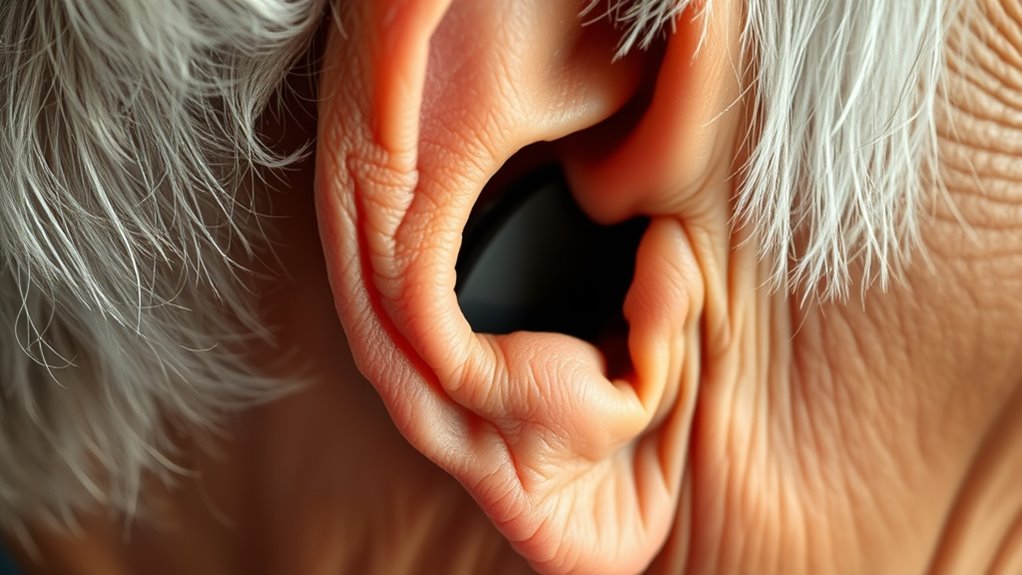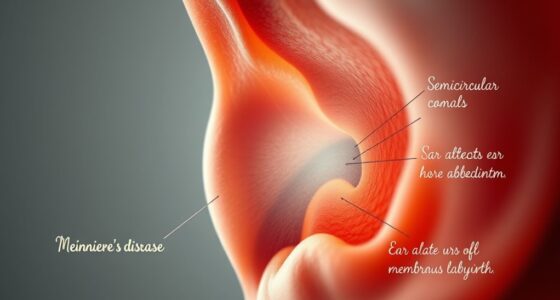As you age, your hearing gradually declines due to the degeneration of inner ear hair cells, making it harder to hear high-pitched sounds and understand speech, especially in noisy places. Early signs include asking for repeats, muffled sounds, or difficulty hearing soft noises. Factors like loud noise exposure, health conditions, and genetics influence how quickly your hearing changes. Staying informed now helps you take proactive steps—continue exploring to learn more about managing and protecting your hearing health.
Key Takeaways
- Hearing loss develops gradually, primarily affecting high-pitched sounds and speech understanding, often unnoticed initially.
- Early signs include asking for repeats, muffled sounds, and difficulty hearing in noisy environments.
- Factors like noise exposure, smoking, and health conditions can accelerate age-related hearing decline.
- Diagnostic assessments involve ear inspections and functional tests, aided by advanced technologies for accuracy.
- Treatment options such as hearing aids and protective strategies can help maintain communication and quality of life.
Understanding Age-Related Hearing Loss
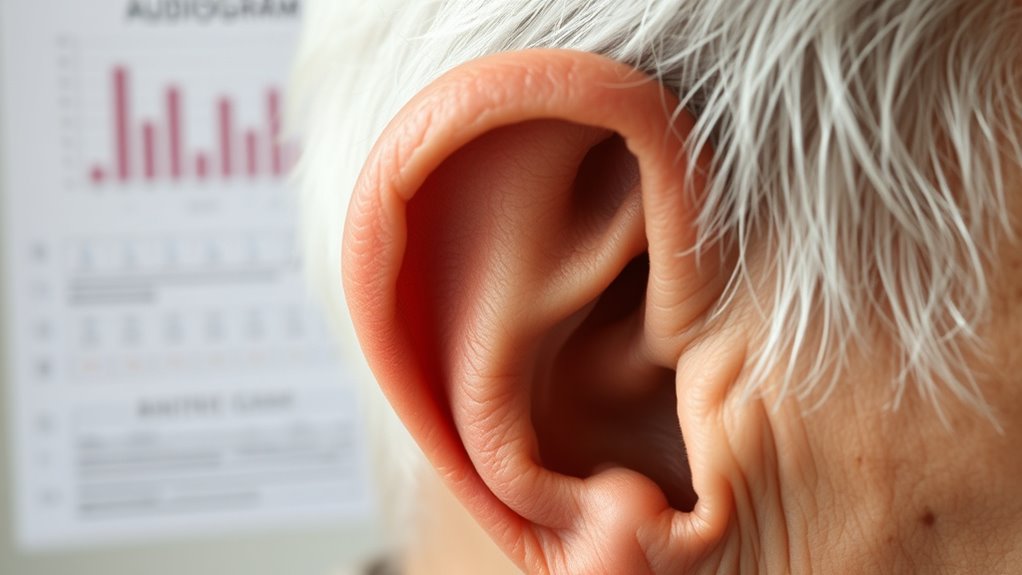
As you age, changes in your hearing become increasingly common due to a natural degeneration of the auditory system. This process, called presbycusis, involves the gradual loss of hair cells in your inner ear that are essential for converting sound waves into electrical signals for your brain. Over time, these cells become damaged or die, making it harder to hear high-pitched sounds and understand speech, especially in noisy environments. Age-related hearing loss typically develops slowly, often going unnoticed at first. It’s a normal part of aging, but it varies from person to person. Factors like genetics, exposure to loud noises, and health conditions can influence how quickly your hearing declines. Recognizing these changes helps you prepare for potential challenges and seek appropriate support. Additionally, understanding the degeneration of hair cells can guide you in exploring protective measures and hearing health strategies.
Common Signs and Symptoms

You might notice that conversations become harder to follow, especially in noisy environments. Tinnitus, or ringing in your ears, can also become a persistent annoyance. Recognizing these signs early can help you seek support and manage your hearing health more effectively.
Difficulty Hearing Conversations
Difficulty hearing conversations is a common sign of age-related hearing loss that many people overlook or dismiss. You might notice that you struggle to follow what others are saying, especially in noisy environments like restaurants or social gatherings. Conversations may seem muffled or unclear, causing frustration or embarrassment. You could find yourself asking people to repeat themselves frequently or missing parts of the discussion entirely. Over time, this can lead to feelings of isolation or withdrawal from social activities. Recognizing these signs early is important because gradual hearing decline can often be managed with timely intervention. Addressing the issue promptly can improve communication, help you stay connected, and maintain your quality of life.
Tinnitus and Ringing
Tinnitus, often described as ringing in the ears, is a common sign of age-related hearing loss that many people overlook. You might notice a constant or intermittent noise that seems to come from inside your head, such as ringing, buzzing, or hissing. This sensation can be bothersome and affect your focus or sleep. Tinnitus isn’t a disease itself but a symptom of underlying hearing changes. It occurs because damage to the tiny hair cells in your inner ear disrupts normal auditory signals, causing your brain to interpret random noise as ringing. While tinnitus can be temporary or persistent, it’s important to recognize it early. If you notice these sounds regularly, it’s a good idea to consult an audiologist for evaluation and potential management strategies.
How Hearing Loss Progresses Over Time
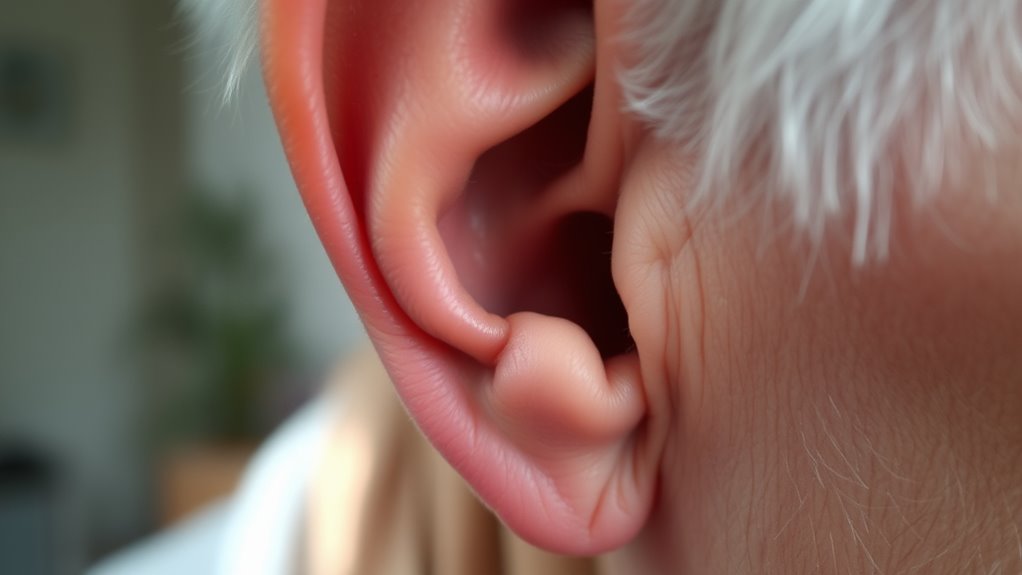
You may notice your hearing gradually worsens over time, often without obvious signs at first. Early on, you might find yourself asking others to repeat themselves more often. As the decline continues, it can considerably affect your ability to communicate effectively. Utilizing professional equipment and practicing proper techniques can help you accurately assess and monitor your hearing health.
Gradual Hearing Decline
As people age, hearing loss typically develops gradually, often going unnoticed at first. You might find yourself asking others to repeat themselves or struggling to follow conversations, especially in noisy environments. Over time, the ability to hear softer sounds diminishes, making everyday sounds like birdsong or clock chimes harder to detect. This slow decline can affect your speech understanding and overall communication. You may notice that you no longer hear high-pitched sounds clearly, such as phone rings or alarms. The loss usually starts subtly and worsens steadily, often over years. Because the change happens gradually, you might not realize how much your hearing has declined until it becomes a significant challenge. Early awareness can help you seek solutions before the problem worsens. Recognizing the ages-related hearing loss early can also improve the effectiveness of interventions and preserve communication skills.
Early Signs Appear
Early signs of hearing loss often appear subtly, making them easy to overlook. You might notice that conversations seem muffled or that you’re asking others to repeat themselves more often. You could find yourself turning up the volume on the TV or radio without realizing it. Sometimes, background noise becomes overwhelming, making it hard to focus on conversations in crowded places. You might also notice that you miss high-pitched sounds, like birdsong or a phone ringing. These changes often develop gradually, so you may not immediately connect them to hearing loss. Recognizing these early signs is important, as catching hearing issues early can help you take steps to manage or slow their progression. Awareness of subtle changes can lead to timely intervention and better outcomes.
Impact on Communication
How does hearing loss evolve and impact communication over time? As your hearing gradually worsens, you might notice conversations becoming more challenging. You could start missing parts of what others say, especially in noisy environments. Over time, you may find yourself asking people to repeat themselves more often or feeling frustrated during discussions. This decline can lead to social withdrawal, making you less likely to join group activities or engage fully. Your ability to understand speech diminishes, especially for high-pitched sounds like “s” or “th.” Without intervention, these communication difficulties can cause misunderstandings and feelings of isolation. Recognizing these changes early helps you seek solutions, like hearing aids, to maintain your social connections and quality of life.
Factors That Influence Hearing Decline
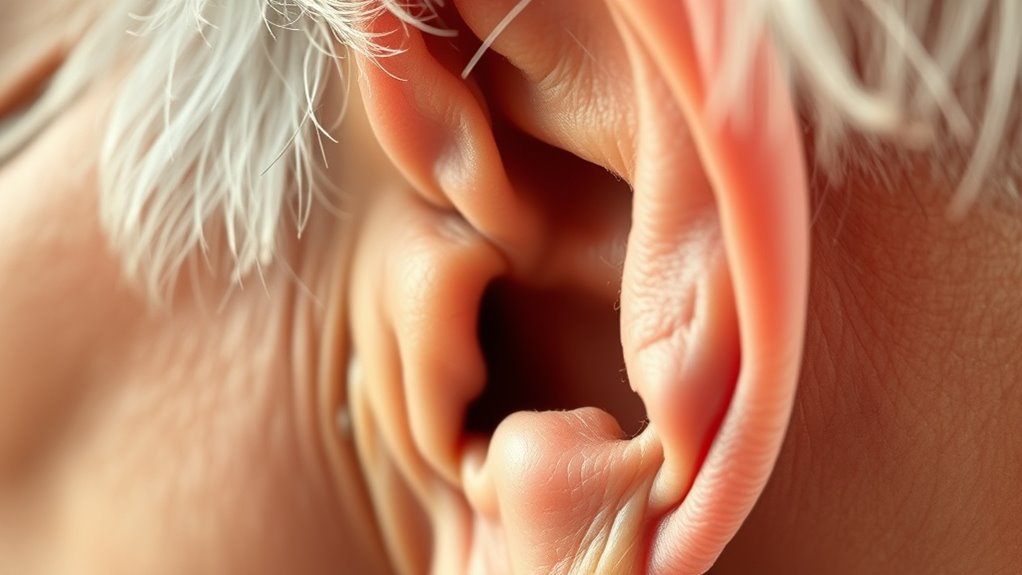
Various factors can accelerate age-related hearing loss, making it a complex condition influenced by both environmental and genetic elements. Exposure to loud noises over time damages delicate hair cells in your inner ear, speeding up hearing decline. Smoking can restrict blood flow to your auditory system, worsening deterioration. Chronic health conditions like diabetes and high blood pressure also contribute by impairing circulation and nerve health. Genetic predispositions may make some individuals more vulnerable to hearing loss as they age. Additionally, lifestyle choices such as poor nutrition and lack of exercise can weaken your overall ear health. Environmental pollutants and ototoxic medications can further damage hearing structures. The type of hearing loss can also be influenced by the technology used in hearing aids, which can either compensate for or exacerbate certain deficiencies. Recognizing these factors helps you understand why hearing loss varies among individuals and highlights the importance of preventive measures.
Diagnostic Processes and When to Seek Help

Understanding when to seek help for hearing concerns is crucial, as early diagnosis can markedly improve management and quality of life. If you notice yourself asking people to repeat conversations, turning up the TV volume, or missing out on social interactions, it’s time to get evaluated. Schedule an appointment with an audiologist for a thorough hearing test, which may include a visual inspection of your ears and functional assessments. These tests help identify the type and severity of hearing loss. Don’t wait until your hearing worsens or you feel isolated; early detection allows for better support options and prevents further decline. Trust your instincts—if something feels off with your hearing, seeking help promptly makes a significant difference. Additionally, advancements in diagnostic processes can aid in precisely identifying the nature of your hearing loss for more effective treatment options.
Treatment Options and Management Strategies
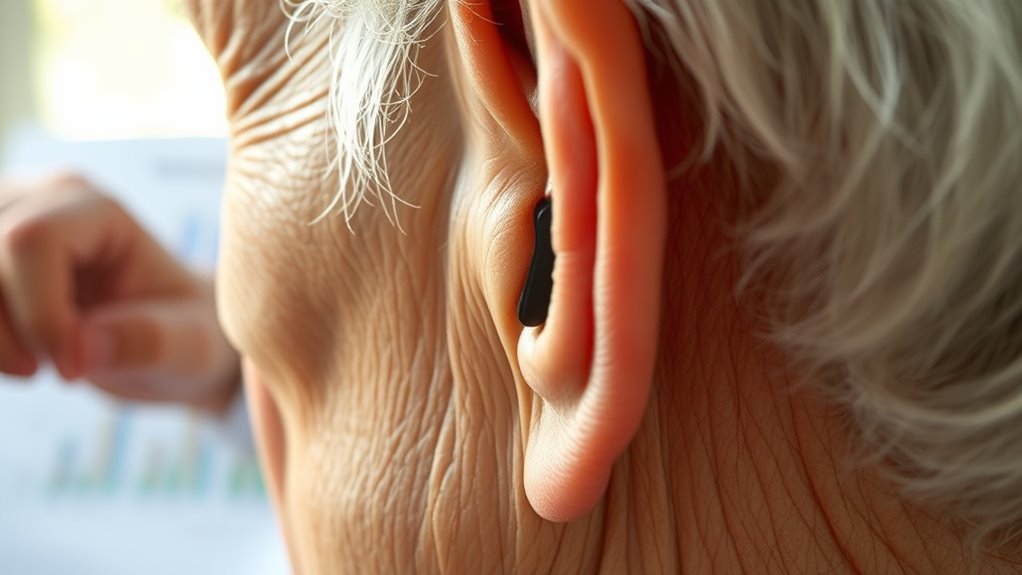
Once you’ve been diagnosed with age-related hearing loss, several effective treatment options and management strategies are available to improve your hearing and quality of life. First, hearing aids are the most common solution, amplifying sounds to help you communicate better. Second, cochlear implants may be recommended if hearing aids aren’t enough. Third, assistive listening devices, like amplified phones or TV devices, can make everyday activities easier. Fourth, you can work with audiologists or speech therapists to develop communication strategies and improve your listening skills. These options can help you stay connected, participate actively, and maintain your independence. Additionally, understanding the underlying causes and progression of hearing loss can enhance your management plan and ensure timely intervention. Remember, early intervention is key to managing hearing loss effectively and reducing its impact on your daily life.
Tips for Maintaining Hearing Health as You Age
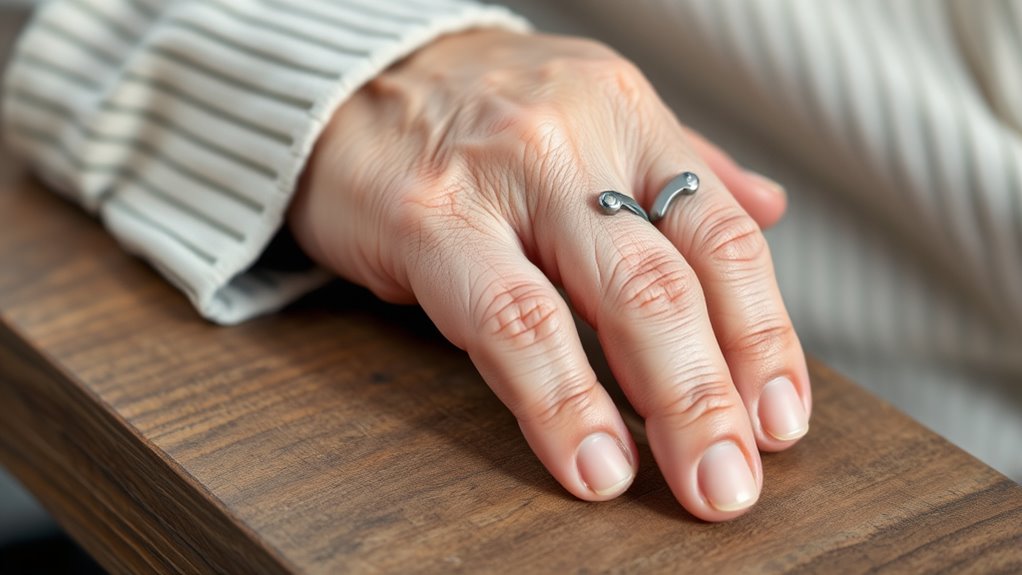
Maintaining your hearing health as you age involves proactive steps to protect and preserve your sense of sound. Regularly avoid loud noises, wear hearing protection when needed, and keep your ears dry to prevent infections. Schedule routine hearing checkups to catch issues early, and manage health conditions like diabetes and hypertension, which can impact hearing. Staying physically active improves blood flow to your ears, supporting overall ear health. Additionally, limiting exposure to loud environments and turning down volume on devices helps prevent damage. Here’s a quick overview:
| Action | Benefit | Tips |
|---|---|---|
| Use hearing protection | Prevents noise-induced damage | Earplugs at concerts or loud work |
| Regular checkups | Detects issues early | Visit audiologist annually |
| Healthy lifestyle | Supports ear health | Exercise, balanced diet |
Being aware of age-related hearing changes can help you take preventive measures to maintain your auditory health over time.
Frequently Asked Questions
Can Age-Related Hearing Loss Be Completely Reversed?
You might wonder if age-related hearing loss can be fully reversed. Unfortunately, it can’t be completely cured because it’s caused by the natural degeneration of inner ear structures over time. However, you can improve your hearing with hearing aids or assistive devices, which amplify sounds and make communication easier. Regular check-ups with an audiologist can also help you manage your hearing health effectively.
Are There Specific Foods That Help Prevent Hearing Loss?
You’re wondering if certain foods can help prevent hearing loss. While no single food guarantees prevention, eating a diet rich in antioxidants, like berries, spinach, and nuts, supports ear health. Omega-3 fatty acids found in fish can also reduce inflammation and protect your hearing. Maintain a balanced diet, limit exposure to loud noises, and avoid smoking to best support your ear health and reduce the risk of age-related hearing decline.
How Does Hearing Loss Affect Mental Health and Cognitive Function?
Imagine your mind as a busy city, where hearing is the vibrant communication network. When hearing loss occurs, it’s like disconnecting a essential street, causing confusion and isolation. You might feel lonelier, anxious, or even depressed as your cognitive pathways weaken. Over time, this can slow mental processes, impair memory, and increase dementia risks. Protecting your hearing helps keep your mental city thriving, connected, and resilient against cognitive decline.
Is Hearing Loss Hereditary or Influenced by Genetics?
Hearing loss can be hereditary or influenced by genetics, meaning your family history plays a role. If relatives have experienced hearing issues, you’re more likely to face similar challenges. Genes can affect your ear structures or how your nerves process sound, increasing your risk. However, environmental factors like noise exposure also contribute. Knowing your family’s history helps you take proactive steps, like regular hearing checks, to maintain your hearing health.
What Are the Latest Technological Advancements in Hearing Aids?
You might be curious about the latest advancements in hearing aids. Today’s devices feature AI-powered sound processing, which automatically adapts to your environment, offering clearer sound. Rechargeable batteries eliminate the need for frequent replacements, and Bluetooth connectivity lets you stream calls and music directly. Smaller, more discreet designs are now available, providing comfort and confidence. These innovations improve hearing experiences substantially, making everyday interactions easier and more natural for you.
Conclusion
As you face age-related hearing loss, remember it’s a journey of change, much like watching a sunset fade into dusk. While your hearing may weaken, early detection and proper care can keep your connection to the world alive and vibrant. Don’t let silence settle in like nightfall. Instead, embrace the tools and strategies that help you hear the music of life, turning what’s inevitable into a chapter of resilience and renewal.
